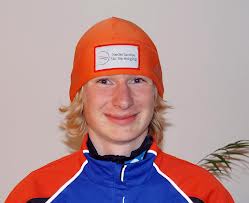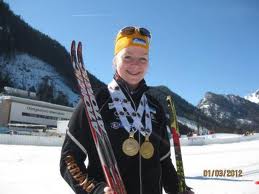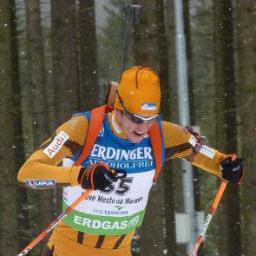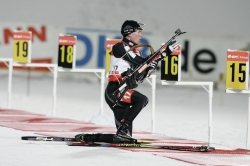Herbert Cool is a former Dutch biathlete who was born in Rotterdam on the 9th of February 1985. He retired from biathlon in 2012, which was far too soon!, with a top finish of 50th in both the Sprint and Pursuit races at the 2008 World Championships in Oestersund. After retiring he began commentating on biathlon for Dutch Eurosport.
Follow Herbert on Twitter: @CoolHerbert
Why did you become a biathlete?
My father loves to go cross country skiing. As we have no snow in the Netherlands we used to spend our vacations in Germany and the Czech Republic. I got into the sport as well, enjoyed it, enjoyed racing against the local youth and sometimes even beating them. Age 18 I participated in the Youth Olympic Games in Bled, Slovenia. I came 9th in the Sprint which was great. We hardly ever trained on snow, only roller skiing and some shooting in a shooting range without a roller ski loop. This made me realize I had a talent for the sport and made me decide to pursue a professional career in biathlon. At age 19 I moved to the US to train with the US Junior team in Minnesota. A year after, I moved to Ruhpolding and stayed there for 6 years.
What are your best memories from your biathlon career?
For sure the first year in the US was the most fun. Obviously it is a great experience to live there on the whole, especially after finishing school. I got to see a lot of the country and was surprised about the large Nordic community it has, not to mention the beautiful cross country tracks. Also, the team was great. Just a bunch of young people wanting to make it in a sport that wasn’t normal in the country they came from. I guess we shared this experience, even though our countries were so far apart. We shared the troubles with funding, we shared having to travel away from your own country to be able to do what you love. And we had a great coach, Vladimir Cervenka, who is still coaching the US Juniors in Minnesota. Of course there were many great memories after that year, but things became a bit more serious, more like a job.
How did you become a commentator for Eurosport and how long have you been doing it?
Unfortunately I didn’t qualify for the Vancouver Olympics. The Dutch Olympic Association wants biathletes to be top 8 in the world, which obviously is a requirement similar to countries like Germany or Norway. However, there is hardly any funding and no talent development whatsoever. I really hope this will change and I am putting energy into this myself, but for now it is unrealistic to expect any talent from the Netherlands (nor is it realistic to expect youth to become interested in the sport, there simply are no facilities). Eurosport gave me a call; whether I would be interested in joining their biathlon commentator during the Olympics. I did, and it was a lot of fun. After I decided to quit in 2012 I pretty much became their new biathlon commentator. I still enjoy it a lot, and nowadays do some other sports as well as some presenting in front of the camera. For example during the 2018 Olympics. It’s a lot of fun and it enables me to stay on top of the sport that I love.
Did you find the transition from biathlete to commentator difficult? Was it harder or easier than you thought? Do you ever run out of things to say? 😉
I think it was the fact that I could become the biathlon commentator at Eurosport that helped me in the transition. You have to understand, I am a city boy. I was born and raised in Rotterdam, the second largest city in the Netherlands. Definitely worth a visit if you have the time. So living in Ruhpolding was about as far away from living in the city as possible. Although I often miss the beautiful nature in the Alps (and the snow, obviously) I also really wanted to go back to Rotterdam. And I’m not just a commentator, I also own a sports management agency. We are into sports marketing, event management and athlete management. For example, this year we will bring a large group of Dutch biathlon fans to the World Team Challenge in Gelsenkirchen for the first year. You’d be surprised how many Dutch people love watching biathlon. When it comes to winter sports, speed skating is obviously the number 1 by far, but I would say biathlon is the second most popular winter sport on television here!
(Definitely not running out of things to say 😉 )
How much and what kind of research do you do before the races?
Honestly, I hardly do any research. I simply love the sport so much that I read and see everything no matter what. Before a race, I obviously do my preparation work, but that doesn’t take a lot of time this way.
Do you have some favourite/memorable races or moments that you have commentated on? Why were they special?
My relationship with the US team runs like a red line through my career. First I moved to Minnesota to train with the US Juniors. After that I moved to Ruhpolding where I was fortunate enough to have Ricco Gross coach me and help me a lot. He helped me connect to the US World Cup team -they waxed his ski’s during that time- and I ended up going with them in some of their training camps as well as travelling with them throughout the winter. A great setup for which I am still very grateful to both Ricco Gross, Bernd Eisenbichler, their high performance director and the team as a whole. It was during the time Tim Burke did very well, he even led the World Cup total score during Christmas, and I roomed up with them and learned a lot. So to answer the question, during the Hochfilzen World Champs there was the epic individual race men’s race. Moravec was in the lead, Lowell Bailey started really late. He shot well, and the finish loop was so intense. I think I screamed during my commentary and for sure I wasn’t very objective, but I didn’t care. It was such a great win for Lowell and I felt a lot of joy, especially seeing all of the wax techs and coaches celebrating afterwards. You know how hard they all work for it and how much effort goes in behind the scenes.
Is biathlon popular in The Netherlands? Can you tell us something about the current biathletes from the Netherlands.
It’s a difficult subject at the moment. The Dutch ski federation has chosen not to invest in talent development. One of the reasons is that the Dutch Olympic Association will only send a biathlete to the Olympics if he or she is around top 8 in the world. This is almost impossible to achieve in general, but especially with no funding, no facilities (no snow) and, very important, no athletes who are already on a World Cup level. You need to train with athletes who are at least as good as you on a daily basis. A good example is Chardine Sloof; she is a talented biathlete who got introduced to the sport because she lives in Sweden. She became a Junior World Champion for the Netherlands, which is crazy. Luck hardly has any influence on the sport of biathlon, if you become Junior World Champion you are talented. Period. After that she struggled with some physical issues and the funding stopped. She decided to switch to the Swedish team. A good decision, because she is surrounded by great athletes, the right culture and great facilities as well. She achieved 3 top 15 results during the Oberhof World Cup 2 seasons ago, really great stuff. I hope we will see more of her in the upcoming season.
Do you have any predictions for the up coming season? Anyone we should be looking out for to do well?
As always after an Olympic season we saw some big names quit. Of course we will miss Domracheva for example. She has one of the best techniques on the women’s side and is of great added value to the exposure of biathlon due to her personality. On a personal note I will miss Bjoerndalen, because he was my idol when I was a biathlete myself. I think Johannes Thingnes Boe will again be a little bit better and more solid this time, although he did admit to not training as much as he should have done in spring. But it will be interesting to see whether Fourcade can take another overall World Cup. I think it’s Boe’s time now. And the Swedes will be strong. They have the momentum after their successful Olympics. Of course there is a big difference between having nothing to lose and being one of the favourites, so this will be a role they will have to get used to. On the women’s side I think Dahlmeier will be very strong, if she stays healthy on her way to December. But I’m afraid that if she wins a lot, she will quit after this winter, which would be a big loss to the sport. I would also keep an eye on Lisa Vittozzi, she made big steps last season and is still very young.
Do you have a favourite biathlon track? Where is it and why?
I loved Östersund. Great atmosphere downtown, great energy on the whole and tracks that suited me. Long uphills that you really had to dig into. Antholz is everybody’s favorite, not only because of the great food and kind people. I always joke during my commentary that they somehow always seem to have a lot of snow, yet the sun is always shining!
Who is your favourite biathlete (past or present) and why?
Bjoerndalen, because he made biathlon into the sport it is today. He pulled it out of cross country skiing’s shadow. His technique was perfection. Someone who also has great balance and style on ski’s is Simon Fourcade, I love watching him ski. When it comes to fighting spirit you have to mention Kaisa Makarainen. Such a great athlete, a fierce competitor on the tracks and a great person once she crosses the finish line.
Did your rifle have a name?
Nope.
Describe yourself in three words.
Ambitious, passionate, calm.
Quick fire Questions:
Favourite biathlon nation (not your own): Right now: Belgium!
Favourite rifle design (any biathlete): Shipulin’s carved rifle looks great.
Favourite ski suit design (from any nation): Not sure which year, and a bit of a different sport, but I loved the suit the Norwegian cross country team had in the last seasons Bjorn Daehlie was racing.
Best thing about being a biathlete: Being active in a worldwide sport that is still small enough to be a small community, and the closeness to nature.
Best thing about being a commentator: Sharing what you love with viewers who really discover your sport -and how great it is. Because biathlon wasn’t really known in the Netherlands, viewers can ask me question through Twitter during the race. This works out great and gives me the chance to bring the sport closer to the Dutch audience.
Follow @biathlon23 on Twitter! Like biathlon23 on Facebook.






